Until about a month ago, I had never read a single book on
diet or nutrition. Even though I am concern with personal health and health
related issues, it never occurs to me that there might exist a relationship
between health and diet. Of course, diet and dieting are multimillion dollar
industry in the country and I have friends who going on to new dieting
schemes every day, I assume diet only affects people who wants to loose
weight. Since I am far from overweight, I have no reason to be interested in
diet and nutrition. This is so until I caught sight of the book, The China
Study, by Colin Campbell and Tom Campbell in Barns and Noble one afternoon.
At first, I thought the book is about China and since I am sort of
interested in things related to China as most of us do, I decided to see
what the book is all about. To my surprise, the book is not about China
really. Instead, it is about diet and nutrition in the United States. How
the Western diet is different from that in China and what are the
consequences or those differences. It is not a scientific study but a
general discussion of what is wrong with our diet and how we must change. It
is written in a manner that a fourth grade student can understand and yet,
all the facts and statistics in the book are back by articles published in
scholarly journals. (I did a count this morning. There are 600 citations at
the end of the book.)
Here are a few highlights of the book that should be of interest to most of
us. All the figures are taken from the book. The first figure below is about
the leading course in the United States.
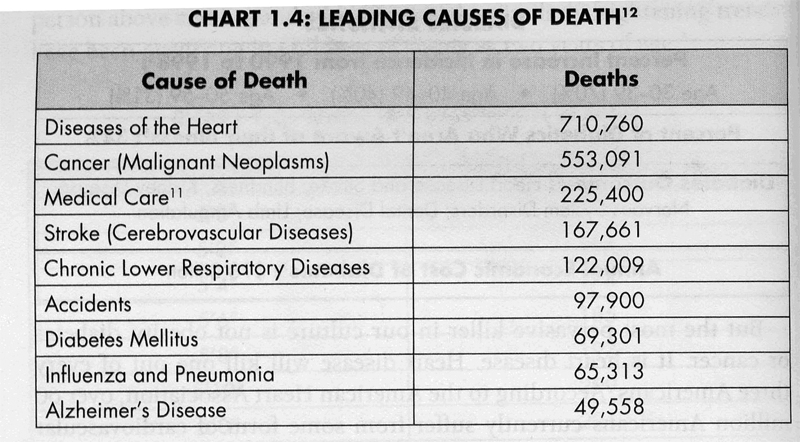
As we all know, the leading cause of death in the US is heart and cancer. I
had seen data like this before from CDC (Center for Disease Control). This
particular table might be a little out of date because I seem to remember
that cancer had recently surpassed heart diseases as the leading cause of
death. Either way, the important thing is that heart diseases and cancer are
our primary concern. Unless we can reduce the incidence of these two causes
of death, whatever plans our leading politicians propose will only make
health care most expensive without actually improving overall health of the
general population.
As I said, I was aware of the statistics in this table before I read the
book and I had always assumed that heart diseases and cancer are the leading
causes of death in all the developed countries and not so developed ones.
What surprises me is that this Book shows that this is not at all the case.
As I shall show you that according to the data cited in this book, the US
have more heart diseases and cancer than almost all the countries in this
world and in comparison, some countries have far fewer heart diseases and
cancer than the US. I am not talking about 10% fewer or 20% fewer. I am
talking about a factor of ten fewer, like 70,000 versus 700,000.
As we all know, the US has spent a great deal of our resource on health
related issues over the last 40 years. Our current spending per person is
second to none according to The China Study and is almost twice that of
Germany, the next country on the list. Now take a look at the next figure.
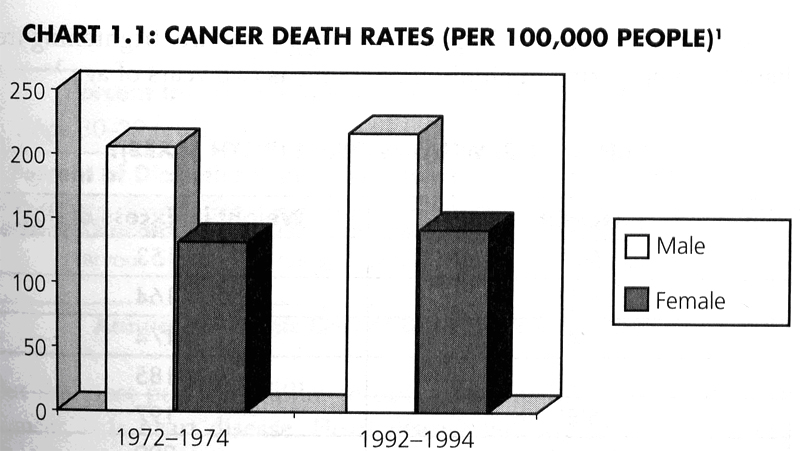
All that money we had spent on health has not reduced the incidents of
cancer in the last twenty years. In fact, if look carefully, the rate of
incidence might be just a little higher now. Isn’t this depressing? Ah, it
is possible that cancer patients do live longer these days due to our
medical advances. Even so, wouldn’t we rather be cancer free?
Now, I am going to show you three figures about hearts diseases and two
types of common cancers in different countries versus the diet pattern in
those countries.
Didn’t I tell you a moment earlier that some country has far fewer heart
diseases than the US? Look at the bar chart below. The US heart disease
death rate is 700 per 100,000 persons and the Yugoslavia rate is only 50.
Would anyone reading this figure come to the conclusion that the Yugoslavs
are doing something right and we are doing something entirely wrong?
Although it is not obvious from this particular chart, the Book maintains
that the secret is in the diet. In effect, we eat too well, much, much too
well. Too much meat, too much cow milk, too many eggs and too much animal in
our diet.
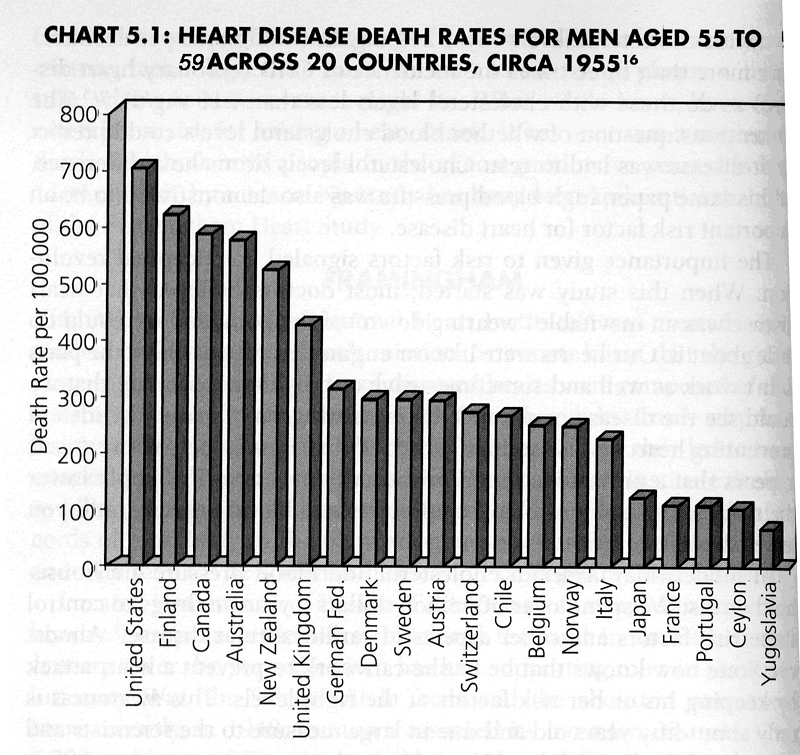
Now, look at the next chart which shows the breast cancer rate in different
countries. We do not have the worst rate in this chart. That belongs to
Netherlands, UK, Denmark, and Canada. The US is way up there though. Once
again the difference between the highest rate of incident and the lowest is
a factor of ten or even twenty.
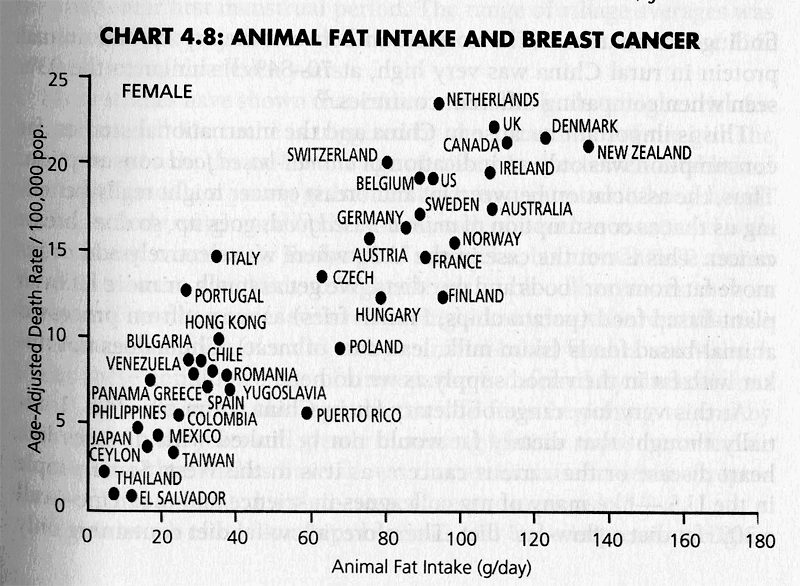
The next chart concerns colon cancer in female. (The Book talked about colon
cancer in male as well but I did not see a chart similar to the one here.)
In this case, the highest incidence rate versus the lowest is a whopping
factor of thirty, 30.
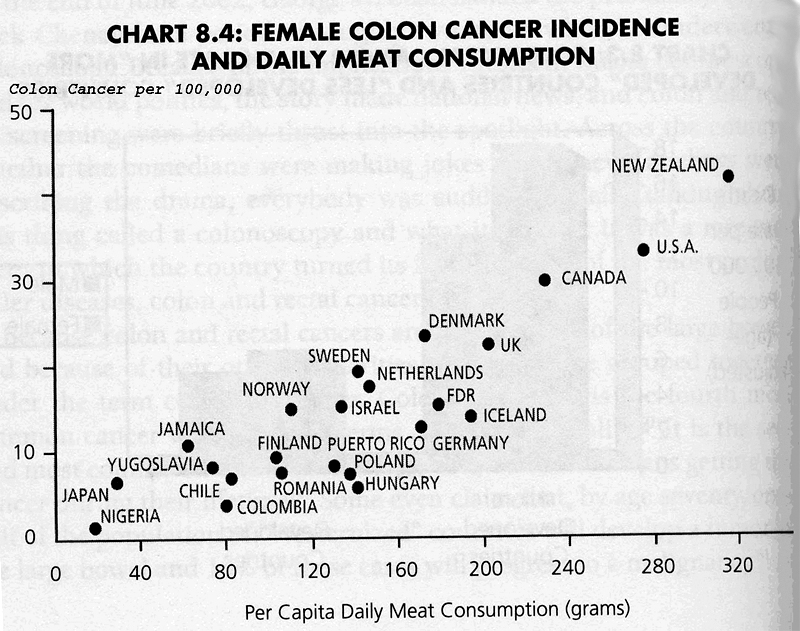
Just by looking at these three charts here, it should be fairly obvious to
the reader that there is a profound relationship between diseases and diet.
In particular, the authors asserted that animal diet is bad and plant diet
is good. I am not going to bore you with any more details but if you are at
all interested, get the book and read it. It talked about diet and many
other common diseases, including diabetes, kidney stones and brain diseases.
Less you think you are Chinese and are not affected by these statistics. The
authors point out that Chinese that immigrated to the US from China suffer
the same diseases at the same rate within one to two generations, i.e. as
soon as they live and eat the Westerners.
What has the title of the book got to do with what I just told you?
According to the authors, Colin Campbell was studying liver cancer in
Philippine when Chou En-Lai was diagnosed with colon cancer. He had a study
done on the cancer rate among the Chinese in all regions of China. The
result was a map of different types of cancer in China which showed great
variations among the Chinese population. These variations suggested to Colin
Campbell that if he could determine the source(s) of these variations, he
would know what controls cancer. Subsequently, he and his Chinese colleagues
did another, more controlled and more general, study of 6500 rural Chinese.
It is the result of these two studies, experiments on live animals and
studying the available data in the literature that led to his conclusions
that a plant diet is much healthier than the traditional animal diet.
If this is so obvious, why hasn’t we been told? Only two days ago, I heard
on TV news that a researcher in England had just showed that meat is cancer
prone, red meat being the worse. The TV program showed the interview with
the research but immediately following that they showed a butcher saying
that it is all rubbish. Meat is good for you. Hey, who could you believe?
As the authors said in the China Study, they presented the studies, the
facts, the data, and the statistics. Do you own analysis and reach your own
conclusion? From what I can see, unless the book is all fabrication, the
conclusions in the book must be correct. Whether I am willing to eat only
plants in my meals is a personal matter.
One last incident may be of some interest. About five years ago, I decided
to do an annual physical with an internist that was recommended in the
Washingtonian magazine. The result came back showing my cholesterol level at
200. At that time, the CDC had just lowered their recommendation from 220 to
200. The doctor said I was a marginal case and must take step to lower that
level. He said I have two risk factors, 1. I am male and 2. I am Chinese. I
certainly could not argue with risk factor number 1 but I had never heard
that being Chinese was a risk factor. In fact, I learned from The China
Study, Chinese has relatively few heart diseases traditional. They have very
few heart diseases if they live and work in China. Here in the States, they
are about average. That doctor also said I should take cholesterol medicine
because dieting wouldn’t work.
I did not agree with the doctor and never went back to see him again. He was
wrong on Chinese being a risk factor and he was also wrong to say that
dieting wouldn’t work. Meanwhile, I went to the web and did a search on just
what is so bad about a cholesterol level of 200? Most doctors would tell you
that level is bad for you heart. How? And to what extent? I found a website
that was sponsored by some university. It asked me to enter my gender, my
age, my blood pressure, my cholesterol level and my HDL. Based on what I
entered, it said I had 1 chance in 10 to die of some heart disease in the
next ten years. 1 in 10 is not that comforting but not so bad either. Being
a scientist, I am curious what my chances would be if I make an effort to
lower my cholesterol level. So, I enter a level of 80. The website refused
to accept that. I entered a level of 130. It came back with a prediction
that my chance was now 1 in 12. That was better than 1 in 10 but hardly
justify the effort to change my diet or take medicine every day.
Just for kicks, I reentered my cholesterol level on that site and changed my
gender to female. Lo and behold, I chance of dying from heart disease in the
next ten years dropped out of sight. For all practical purpose, I was more
likely to get hit by lightning. Oh, well. My only real option is to change
sex.
One final observation, the China Study says nothing about living longer if
one adopts a plant only diet. It only promises fewer diseases.
|


![]()
![]() Get
your own Free Home Page
Get
your own Free Home Page